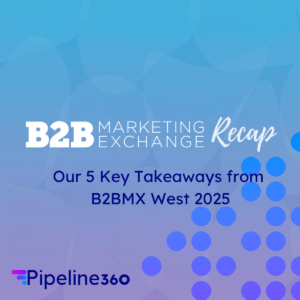In today’s digitally driven world, data privacy is a rising concern for both consumers and businesses globally. It all started with the EU’s General Data Protection Regulation (GDPR), which launched in 2018 and marked the beginning of a new era of heightened focus over privacy laws and compliance. It established the global standard, paving the way for the California Consumer Privacy Act (CCPA) in 2020 and spurring 15 states to pass comprehensive data privacy laws in the U.S. to-date.
Below, we outline the data privacy law timeline, the implications for B2B marketers, and how to move forward.
The current state of privacy laws
Privacy laws are on the rise due to a heightened focus on safeguarding consumer data and the call for businesses to exhibit transparency and accountability in their data management procedures. Each law introduces distinct provisions and demands, posing a challenge for B2B marketers as they navigate this intricate regulatory landscape.
- California. California was the first state to enact a comprehensive data privacy legislation, California Consumer Privacy Act (CCPA), which went into effect Jan. 1, 2020. It was amended by the California Privacy Rights Act (CPRA), effective date Jan. 1, 2023, with enhanced data privacy rights.
- Virginia. Virginia became the second state to pass comprehensive data privacy legislation, with the enactment of Virginia Consumer Data Protection Act (VCDPA), effective Jan. 1, 2023.
- Colorado. The Colorado Privacy Act (CPA) was signed into law on June 8, 2021 and took effect on July 1, 2023.
- Utah. The Utah Consumer Privacy Act (UCPA) passed on March 24, 2022 and took effect on December 31, 2023.
- Connecticut. Connecticut became the fifth state to implement comprehensive consumer privacy legislation with the Connecticut Data Privacy Act (CTDPA, on May 10, 2022. effective as of July 1, 2023.
Future privacy laws taking effect
Four states have data privacy laws that will take effect in 2024:
- Florida. The Florida Digital Bill of Rights (FDBR) was signed into law on June 6, 2023 and goes into effect on July 1, 2024.
- Oregon. The Oregon Consumer Privacy Act was passed on June 22, 2023 and take effect on July 1, 2024 (with a July 1, 2025 effective date for nonprofit organizations).
- Texas. The Texas Data Privacy and Security Act (TDPSA) was passed on May 28, 2023 and is enforceable starting July 1, 2024. them to disclose data practices and provide consumers with opt-out options.
- Montana. The Montana Consumer Data Privacy Act (MTCDPA) passed on May 19, 2023 and comes into force on October 1, 2024.
In 2025, five states will follow suit with new data privacy laws:
- Delaware. The Delaware Personal Data Privacy Act was passed on June 30, 2023 and is set to take effect on January 1, 2025.
- Iowa. The Iowa Data Privacy Act was signed into law on March 28, 2023 and comes into effect on January 1, 2025.
- New Hampshire. The New Hampshire Privacy Act (NHPA) was signed into law on Jan. 18, 2024 and takes effect Jan. 1, 2025.
- New Jersey. The New Jersey Data Privacy Act (NJDPA) was signed it into law on Jan. 16, 2024 and takes effect a year later on Jan. 15, 2025.
- Tennessee. The Tennesse Information Protection Act (TIPA) was passed on May 11, 2023 and is effective July 1, 2025.
And in 2026, Indiana’s privacy law will go into effect:
- Indiana. The Indiana Data Privacy Law was signed on May 1, 2023 and comes into effect on January 1, 2026.
While each law has its nuances, the state privacy laws all require:
- Notice at time of collection: At the time of collection of personal information, the consumer must be provided with a working link to the collector’s privacy notice.
- Consumer Rights: Access, Correction, Portability, Deletion, Limit Processing and Opt-out of sale, profiling, and targeted advertising.
- Fines ranging from $2,500 (CA for an unintentional violation) to $500,000 (CO $20,000 per violation and up to $500,000 per event leading to the violation). Most of the states have set a maximum penalty of $7,500 per violation.
Implications for B2B marketers
This shift toward more stringent data privacy laws has significant implications for B2B marketers who rely on data-driven strategies to connect with their target audience and drive business growth. To adapt to this changing landscape and maintain compliance, consider these crucial steps:
The trust factor. Amidst these data privacy laws lies a critical concern: trust. Businesses rely heavily on trust to foster long-lasting relationships with clients and partners. Trust forms the bedrock of successful collaborations and transactions. Yet, trust is easily eroded when data privacy is compromised.
The risks of data mishandling. In an era marked by data breaches, privacy scandals, and regulatory scrutiny, the stakes have never been higher for businesses to prioritize data privacy. A single data breach can lead to severe consequences, including financial losses, reputational damage, and legal repercussions. Moreover, with the new wave of stringent data protection regulations, non-compliance can result in hefty fines and penalties.
Building a culture of privacy. B2B marketers must champion a culture of privacy within their organizations. This entails adopting robust data protection measures, implementing secure data storage and transmission protocols, and ensuring compliance with relevant regulations. Moreover, transparency is key—businesses must be upfront with their customers about how their data is collected, used, and protected.
The competitive advantage of privacy. Beyond regulatory compliance, prioritizing data privacy can confer a significant competitive advantage in the marketplace. By demonstrating a commitment to safeguarding customer data, businesses can differentiate themselves as trustworthy and reliable partners. This, in turn, can enhance brand loyalty, foster stronger customer relationships, and drive sustainable growth.
Moving forward in a data privacy world
The expansion of data privacy laws underscores the importance of data protection in the B2B marketing landscape. As a B2B marketer, it’s essential to proactively address these regulatory challenges and adapt your strategies accordingly. Failure to comply with these evolving laws could result in legal, reputational, and financial risks.
At Pipeline360, we are committed to making it easier for B2B marketers to do their jobs. And that starts with prioritizing clean, compliant data. Marketable and compliant data underpins all your marketing efforts. Data quality is critical to support your buyers across all channels and paves the way for everything from building a great customer experience to developing strong strategies. We’ve also invested in a full-time team of legal and data security professionals to monitor, audit and manage data privacy and compliance, as well as having our processes audited to pass ISO and SOC certifications. In today’s world, it’s important to take the necessary steps to ensure compliance so you can continue to effectively connect with your target audience while respecting their privacy rights.





